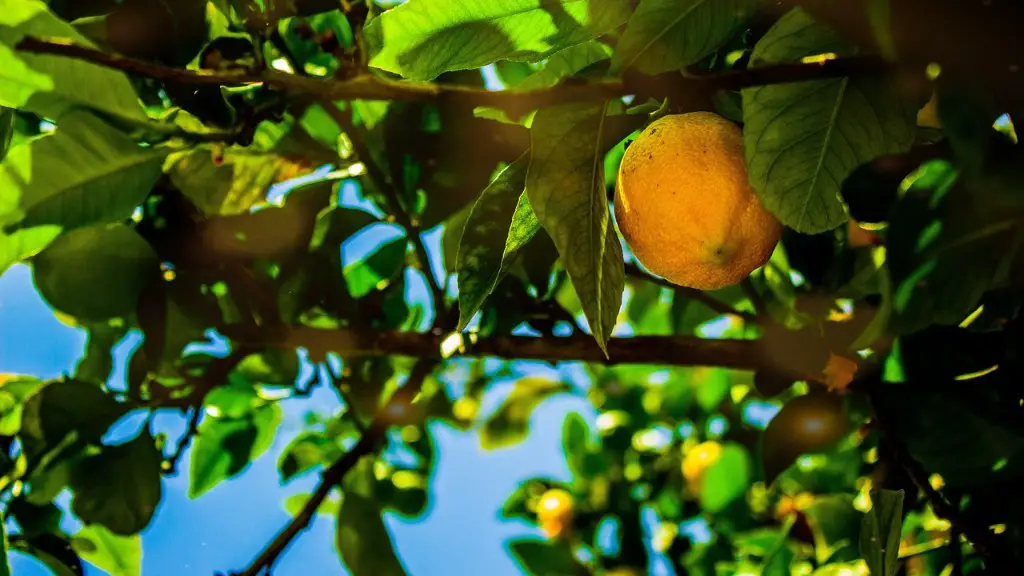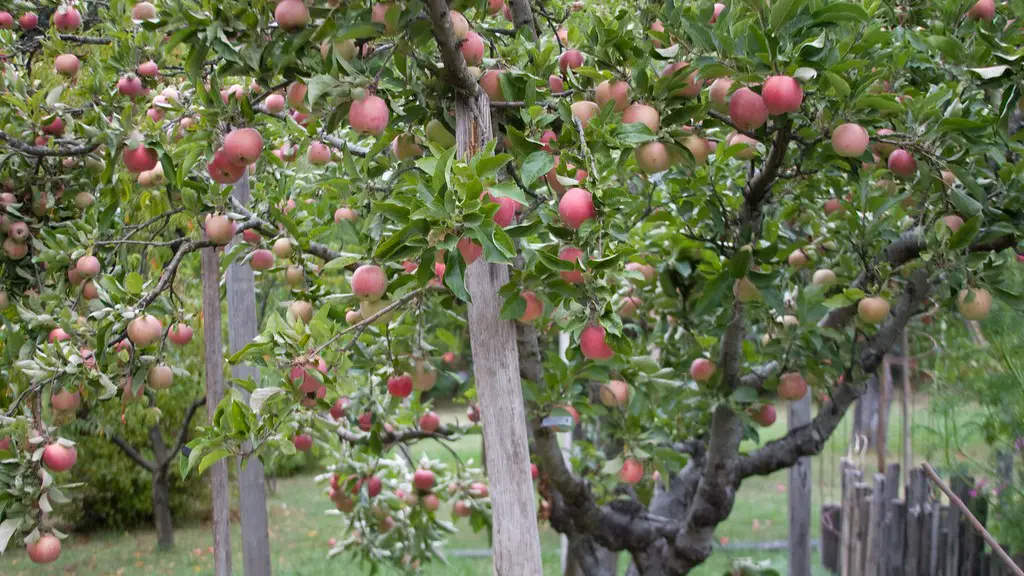The lemon tree is a popular citrus tree that is grown in many home gardens. While the lemon tree is relatively easy to grow, there are a number of reasons why it might not produce fruit. The most common reason is that the tree is not getting enough sunlight. Lemon trees need full sun in order to produce fruit. If the tree is located in a shady area, it is unlikely to produce any fruit. Another reason why the lemon tree might not be producing fruit is because it is not getting enough water. The tree needs to be watered regularly in order to produce fruit. Finally, the lemon tree might not be producing fruit because it is not getting enough nutrients. The tree needs to be fertilized regularly in order to produce fruit.
There could be many reasons why your lemon tree is not producing fruit. It could be that the tree is not getting enough sunlight or water, or that the soil is not nutrient-rich enough. Another possibility is that the tree is not old enough to produce fruit yet. If you have been caring for your lemon tree properly and it is still not producing fruit, you may need to consult with a professional to find out what the issue is.
How do I get my lemon tree to flower?
Lemon trees are subtropical plants that need cooler temperatures to encourage blooming. During the winter and early spring, try to leave your potted lemon tree in cooler temperatures, around 60 degrees Fahrenheit, for at least a few hours every day. This will help the plant to produce flowers.
Lemon trees require a warm climate to produce fruit, and prolonged exposure to extreme cold temperatures can damage the tree and cause it to lose its blossoms. If your lemon tree is exposed to cold temperatures, make sure to protect it from the cold by wrapping it in burlap or another type of insulating material.
Do you need 2 lemon trees to produce fruit
That’s good news for those of us who want to grow our own lemon trees indoors! All you need is one healthy lemon tree to get started.
Once your lemon tree blooms, it’s time to start pollinating. You can do this by gently shaking the blooms, which will release the pollen. You can also use a small paintbrush or cotton swab to transfer pollen from the stamen (the male part of the flower) to the pistil (the female part).
After pollination, the flowers will fall off and small lemons will start to form. As the lemons grow, you’ll need to do some light pruning to encourage good fruit production. Just snip off any excess growth, such as water sprouts or suckers. And be sure to remove any lemons that are damaged or diseased.
With a little care, you can enjoy fresh lemons from your own indoor lemon tree!
Lemons are a fruit that we typically think of as having seasons. However, lemon trees actually begin to produce fruit somewhere between 4 months to one year after flowers blossom. This means that your lemon tree could be fruiting in any season. Typically, lemon trees will fruit in the winter.
How do you encourage a lemon tree to fruit?
It’s important to fertilize your lemon tree in the springtime in order to encourage blooming and fruiting. Be sure to add phosphorus to the food, and prune only where necessary. Fruits will set on the ends of branches, so it’s best to remove only dead wood and problem branches.
This is an all-purpose pesticide that can be used on fruit, citrus, and palm trees. It is effective against a wide variety of pests, including aphids, mites, and whiteflies.
What is good fertilizer for lemon trees?
Thanks for choosing Down to Earth Organic Citrus Fertilizer for your lemon tree! This granular fertilizer has an NPK ratio of 6-3-3 and is great for lemon trees because it’s applied three to four times per year. It also contains secondary nutrients like calcium, sulfur, zinc, and iron, which are essential for lemon trees. Thanks again for choosing Down to Earth Organic Citrus Fertilizer!
A healthy lemon tree will continue to bear fruit until its death. It takes a lemon tree about 3 to 5 years to reach a reproductive maturity that results in fruit production.
How often do you water a lemon tree
A lemon tree should be watered about once a week, or every other week. This schedule depends on the rainfall in your area or the humidity indoors. A consistent watering schedule is important to keeping your lemon trees healthy. If you’re not sure when to water your lemon trees, just check the top 2 inches of soil.
Lemon trees love nitrogen and calcium, both of which are found in coffee grounds. Coffee grounds also improve the tilth (texture) of the soil, making it more aerated and easier for roots to grow. However, it’s important to only use coffee grounds after they have been fully decomposed in a compost pile, as fresh coffee grounds can actually harm plants.
Should I prune my lemon tree?
Cutting back lemon trees is not necessary to improve light availability because citrus trees can fruit throughout the tree, including shaded areas. However, young trees should have any sprouts removed and any weak limbs pruned out.
Adding coffee grounds to the soil of an orange tree can help to improve the soil structure and add essential nutrients. Coffee grounds add phosphorus, magnesium, nitrogen, copper and potassium to the soil, which can help the tree to grow more effectively.
What month do lemons fruit
The Meyer lemon is a hybrid citrus fruit originating from China. Its main crop is produced in winter but it can crop continuously throughout the year. It’s a small tree growing to around two metres in height, making it the ideal lemon tree to grow in a pot. Meyer lemons are less acidic than standard lemons, with a sweeter, more floral flavour. They can be used in the same way as regular lemons, but are especially good in desserts and cocktails.
Lemon trees produce fragrant, white flowers in clusters at the ends of the stems. Most citrus trees bloom in spring and then produce fruit that is ready to harvest in fall and winter, although you may see stages of blossoms, fruit growth and fruit maturity all year round.
How long does it take for a Meyer lemon tree to bear fruit?
Meyer lemons are a type of citrus fruit that is thought to be a cross between a regular lemon and an orange. trees can bear fruit in as little as two years, while seed-grown Meyer lemon trees can take anywhere from three to seven years to produce fruit.
magnesia is an important factor for the growth of lemon trees. If the leaves of your lemon tree are turning yellow, it is likely due to a lack of magnesium in the soil. You can correct this deficiency by mixing 30g of Epsom Salts per litre of water (approximately 2 tablespoons), per tree.
What are three common problems that lemon trees can have
Lemon trees are susceptible to a number of problems, including citrus canker, sooty mold, botrytis blight, anthracnose, and lemon scab. Lesions on leaves are the first sign of citrus canker, and these can quickly spread to cover the entire leaf. Black moldy spots are indicative of sooty mold, which is often caused by aphids. Fuzzy gray mold and brown spots are signs of botrytis blight, a fungal disease that can kill the tree if left untreated. Tan spots with dark outlines are caused by anthracnose, another fungal disease. Brown scabs on the lemon are the result of lemon scab, a bacterial disease.
If you leave lemons on the tree for too long after they ripen, they may develop thick, puffy skin. You can wait to pick until the lemons have turned fully yellow, but to ensure juiciness and thinner skins, pick them while there is a little green still on the fruit.
Final Words
There are a few possible reasons why your lemon tree is not producing fruit. It could be that the tree is not getting enough sunlight, or it might be that the tree is not getting enough water. It could also be that the tree is not getting enough nutrients. If you are not sure what the problem is, you might want to consult with a gardening expert.
The most common reason for a lemon tree not to produce fruit is that it is not getting enough sunlight. Lemon trees need a minimum of eight hours of sunlight per day to produce fruit. Other reasons for a lemon tree not to produce fruit can include being too young or too old, being stressed from too much or too little water, or having a nutrient deficiency. If you think your lemon tree is not getting enough sunlight, try moving it to a sunny spot in your yard.





